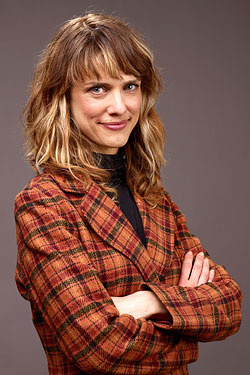
“Maybe all the theaters will burn down before people get a chance to see it.” Her film may be opening today, but Lynn Shelton is still keeping her expectations low — which must come as a surprise to anyone who has been following the fortunes of the director’s Sundance phenomenon Humpday, a stupefyingly funny and amazingly poignant super-low-budget comedy about two straight best friends (Mark Duplass and Joshua Leonard) who decide to make an amateur gay porn film together. But Shelton is a far cry from your starry-eyed overnight film-festival success. A forty-something mother with a background in experimental film, the Seattle-based Shelton has been following her voice and making decidedly independent videos and films for over a decade now, garnering numerous awards along the way. But Humpday has been a buzz title ever since its first rapturous screenings at this year’s Sundance, and Hollywood has come calling. Our hope is that her pile-on of good luck continues when American audiences finally begin to discover Humpday this weekend. Provided, yes, that all the theaters don’t burn down first.
Humpday is, in many ways, such a crowd-pleasing film that it’s interesting to find out that your background is in experimental film.
I first came to filmmaking at a very serious arts program, studying Photography and Related Media at the School of Visual Arts, which is really focused on helping people to become serious, professional gallery artists — like people who are going to show up at the Whitney Biennial, that sort of thing. I took a video workshop, thinking I’d get a chance to play around and not be very serious. In doing that, I started to find my voice. And when I started in video and film, it was about pure expression. I wasn’t thinking about audience; I was purely pleasing myself. My thesis project was an exploration of different levels of consciousness, about dream logic and dream states. Turning over a rock and seeing all the bugs and things under it. That was what my work was like.
So, when did that change?
I had a miscarriage, right in the middle of making a movie about the psychological and emotional effects of becoming a mother. I remember making a very distinct decision to make a film that would attempt to be accessible. I wanted to get the film shown on PBS. I still remained true to my visually poetic aesthetic, so what emerged was like a very grounded radio documentary, with beautiful, abstract, associative footage. And I realized I liked having an audience — I liked making work that was going to get seen by more than twelve people! I became less suspicious of making things more accessible. And I’ve discovered over the course of time that the things I like, other people like, too.
So, how did you get the idea for Humpday?
I wanted to work with Mark Duplass. We had a lot of mutual friends, and we had some bonding time in Seattle, on a movie called True Adolescents. I was the stills photographer, and he was just amazing to watch on set. I said I wanted to direct him in something. He said, “Pitch me something.” While I was thinking of something to put Mark in, another buddy of mine, Joe Swanberg, had come to stay with me. He saw some gay porn for the first time in this festival. It had a real effect on him. It was sweet — here was a straight guy talking about the gay porn that he had seen. And he talked about it a lot. It got me thinking about the relationship between straight men and gayness, and why that’s such a giggly thing. Even for the most progressive and open-minded straight guy, there is this residual anxiety when it comes to his own personal relationship to homosexuality. So that got my brain going. I loved the idea of two guys who were so straight that hey had boxed themselves in this corner, to be gay for a day.
It’s suspenseful — almost like watching people plan a bank robbery. It builds up to a specific event, and we see them preparing, and we’re asking, “Will they or won’t they?”
Yeah. I like that bank robbery comparison. It hopefully keeps you on the edge of your seat wondering what’s going to happen next. Every scene draws you through — I have that very clearly in mind.
So, what about that final scene, when they go to the hotel room to try and make their movie?
Our outline ended at the hotel room door. We shot the film in sequence, and by the time we got to that hotel room, I told these guys, “You guys really know your characters well by now. We’re going for total honesty here. I trust you to live out this scene as these characters.” And so we left any preconceived ideas about the scene at the door. We totally dove in and then just worked on it chunk by chunk, all the while making sure these guys remained true to these two dudes they were playing. It was really exciting, and exhausting. By the end of the night of shooting that scene, the boys were actually convinced we didn’t have it. They thought I’d have to fly out to L.A. and have to do more shoots with them. But I was pretty sure we had it.





